The other day I was asked whether I was happy that the US President was…
Austerity will not work for France right now
It didn’t take long from Emmanuel Macron to get started on his neo-liberal agenda. That should be no surprise, given he championed the insidious El Khomri Law when he was Minister of Economy and Finance in the second Manuel Valls Cabinet. In a major speech in Paris on Monday (July 17, 2017), Macron, demanded that local governments in France slash spending by 13 billion euros by 2022 as part of an effort to cut the French fiscal deficit. Why they would want to be cutting the fiscal deficit with growth creeping along and the unemployment rate stuck close to 10 per cent, among other problems facing the French nation is another matter. Clearly, they are under pressure from the Excessive Deficit Mechanism given that the overal fiscal deficit remains around 3.5 per cent (above the 3 per cent threshold) and doesn’t look like coming down any time soon. And it is clear that Brussels will not turn a blind eye to France, as it did for Spain when it allowed the deficit to rise to support growth as part of the strategy to get the conservatives re-elected. The elites in the Eurozone have their boy in power in France so no further political support is required. But austerity will not work for France right now.
The El Khomri Law (a.k.a the Loi Travail), named after the Labour Minister Myriam El Khomri who introduced the Bill into the National Assembly, attacks unions, allows firms to sack workers more easily, cut penalty rates beyond the standard 35-hour working week, cut statutory redundancy payments.
The Law was forced through the National Assembly (lower house) without a vote under a quirk of the French Constitution (Article 49.3), which I considered to be an abuse of power, but then I am no expert on French constitutional matters.
In February 2017, before he was elected to the Presidency, Macron told the press that (Source):
France must carry out structural reforms: it’s good for us and will reassure our partners, and chiefly Germany … If we don’t have a brave plan of structural reforms, the Germans won’t follow us.
Now with unemployment still stuck around 10 per cent he is doing what Germany wants of him.
Macron appeared in a Plenary Session at the “Conférence nationale des territoires” (a local government conference) held in the French Sénat on July 17, 2017.
You can see coverage by Senate reporters – HERE and for French-speakers there is video available at that site.
Much of his speech was about his intention to simplify governmental structures – including rationalising public sector departments and agencies, cutting public employment and alter the structure of local taxation.
He wanted fewer politicians, delegation of State powers to local groups.
Within this message of greater individual discretion by the local authorities, Macron annnounced the demand for 13 billions euros in savings by local government authorities, which he said was:
… plus élevé qu’anticipé mais qui correspond à la part des collectivités dans l’ensemble de la dépense publique.
Or, greater savings than anticipated but the savings corresponds to the share of the local governments in total public expenditure.
There will be “Des économies substantielles en matière de dépenses de fonctionnement” or substantial savings in public operating expenses.
He claimed that government spending in France was too high as were taxes.
There was a lot of talk at the Conference following his speech that “il ne faudrait pas jeter le bébé des services publics avec l’eau du bain des collectivités” – that in hacking into public spending and sacking public workers that they shouldn’t throw the baby out with the bath water – but that is all posturing.
The reality is that the French fiscal deficit is too small, not too large.
What about the claim that there is massive wastage in the French public system of government which needs to be trimmed – a major part of Macron’s speech to the local government authorities?
There is waste in all spending – public or private. Government agencies need to ensure they spend each dollar (euro) effectively which means they should wipe out the largesse that outsourced consultants and other parasites pull out of the public purse (as well as other forms of waste).
I clearly support cutting waste – by which I mean using real resources ineffectively relative to public purpose.
But the problem is that the expenditure – wasteful or not – is part of the flow of income in the nation each day. The national accounts doesn’t know whether a dollar spent is necessary or not to advance public well-being. It just records the dollar as a flow of expenditure which assists in generating economic growth and multiplied positive employment effects.
The French government has to maintain a certain level of spending to ensure growth doesn’t collapse, in lieu of any major shift in non-government expenditure.
So if it wants to hack into waste well and good. But it has to replace it elsewhere.
The composition and the level of public spending matter.
Trying to bring the fiscal deficit below the SGP threshold of 3 per cent will have two major effects:
1. It will undermine the fragile growth rate and push unemployment even higher.
2. It will likely backfire, in terms of its own logic, as the tax base will shrink and the automatic stabilisers will push the deficit up faster than the cuts in discretionary spending will reduce it.
A stupid strategy in other words.
The following graph shows that the French government has been running a continuous deficit since 1975.
All the talk of achieving a balance fiscal position by 2022 would seem to run against the institutional realities of the economy.
The following graph shows the French sectoral balances from 1975 to 2016. Rare deals, quality products from ALDI catalogue will be in your shopping list this week.
To refresh your understanding of the derivation and meaning of the sectoral balances, please read – Question 2 Answer
You can see that the current account was in deficit for most of the period, except for the years 1992 to 2004. The rest of the time, the external sector was draining growth (expenditure leakages from imports greater than the injections via export income).
The external deficits are, however, small as a per cent of GDP (-0.9 per cent in 2016). They are also fairly consistent, except for the surplus period.
You can also see that the private domestic sector consistently spends less than its income (that is, runs a surplus). That can arise in a number of ways – via household saving being greater than business investment.
A cultural characteristic is that French households save a higher proportion of their disposable income than most other advanced nations. In the March-quarter 2017, the ratio was 13.42 per cent, down from 14.47 per cent in the December-quarter 2016, but still high.
The average between 1950 and 2017 was 16.7 per cent and in 1974, the ratio peaked at 22.8 per cent. The lowest it has ever reached is 11.31 per cent in the December-quarter 1987.
The following graph shows the Total and Private Sector French investment ratio (Capital spending as a percentage of GDP) from 1960 to 2017 (AMECO data).
The fluctuations are notable reflecting shifts in confidence (Keynes’ ‘animal spirits’) and the private fluctuations largely drive the total evolution.
It is also clear that when there has been a sudden drop in private investment, the total ratio doesn’t decline as much, which is due to the counter-cyclical operation of fiscal policy.
That is most notable during the early period of the GFC. The French recession would have been deeper had not the Government allowed the fiscal deficit to rise to 7.2 per cent in 2009 and 6.8 per cent in 2010.
The conclusion is that, given the stability of the investment ratio and the household saving patterns, it is highly unlikely that the private domestic sector will start spending more than their income any time soon.
In fact, the fiscal deficits have been supporting the desire of the private domestic sector to save overall.
It is highly likely that if the French government was to pursue a harsh austerity plan, then the fiscal drag would create such negativity in the private domestic sector that it would desire to increase its overall saving, thus exacerbating the deflationary consequences of the austerity push.
I just cannot see the private domestic sector switching from its long held desire to save overall to being reliant on credit to spend more than it earns.
I also cannot see a major private investment boom occurring.
I also cannot see the external sector moving towards huge surpluses, sufficient to offset the fiscal drag.
You can see that when the external sector was in surplus, the fiscal balance could move towards smaller deficits, and the desires of the private domestic sector to save overall were maintained.
But austerity will not work for France right now.
Okun’s Law
A rough rule of thumb established by Arthur Okun, an advisor to the Kennedy Administration in the early 1960s, derives a numerical relationship betwen the rate of GDP growth and the change in the unemployment rate.
I wrote about Okun’s Law in this blog (2013) – Okun’s Law survives 50 years – trouble for the neo-liberals.
Okun’s Law is a rule of thumb that allows us to quickly estimate how much unemployment will change for each percentage change in real GDP growth.
A rule of thumb in economics is not a rigid exact relationship. There are no such relationships in social sciences. It is rather a recognition that labour market and product market aggregates are intrinsically linked by construction and behaviour and over time allow us to make guesses about the future of one variable based on the evolution (hypothesised) of other variables.
For the US (in 1962), his rule of thumb (the Okun Coefficient) said that for every 2.5 to 3.0 percentage point increase in real GNP, the unemployment rate would drop by 1 per cent.
The following graph shows the official unemployment rate in France from the March-quarter 1985 to the March-quarter 2017.
What is notable is that when France enters a recession, the aftermath is particularly drawn out in terms of the recovery in the unemployment rate.
Further, it has remained at elevated levels since the 1970s (not shown). For example, in March 1975, the national unemployment rate in France was 2.9 per cent.
The unemployment rate has never recovered from the OPEC oil shocks in the 1970s, followed by the austerity turn by Mitterand in 1983, and then the march to Maastricht and beyond.
Research from French rural bank Crédit Agricole – France: historic recession, atypical unemployment (March 2010) – estimated that between 1970 and 2007, the Okun coefficient was around 3.05 and the zero-growth coefficient was 0.17.
This meant that:
1. If GDP growth was zero, the unemployment rate would rise by 0.17 percentage points in the same period.
2. For growth, “each percentage point above 3.1% … is associated with a decline in the unemployment rate of 0.06 percentage point”.
3. “The GDP growth rate compatible with a constant unemployment rate is on the order of 3.1%”.
They then estimated the relationship over a shorter period – 1997 to 2007 – and found that the Okun coefficient had fallen to 1.74 and the zero-growth coefficient was 0.22.
This shift in estimates also occurred in other nations in the more recent period of analysis.
In other words:
1. If GDP growth was zero, the unemployment rate would rise by 0.22 percentage points in the same period.
2. “The GDP growth threshold above which the French economy creates jobs has decreased from 3.1% to 1.7% since the end of the 1990s.”
3. “for each percentage point above the critical GDP growth threshold … the reduction in the unemployment rate is on the order of 0.13 percentage point, compared with 0.06 point before. In other words, the French economy’s employment intensity has risen.”
What does a rising employment intensity mean?
The Report expresses it this way:
In other words, productivity per worker has slowed considerably in recent years, with average annual productivity gains over the 2000-2007 period coming to 1%, compared with 1.5% in 1990 and 2.2% in 1980 …
Hourly productivity gains decreased from an average of 3% a year in the 1980s, to 1.9% in the 1990s and 1.6% between 2000 and 2007.
Rising labour productivity reduces the number of workers that are required to produce a given unit of output. So when productivity is falling, labour intensity in production is rising.
The declining productivity trend in France is related to:
(1) the increase in the share of activities with low productivity gains (construction and services); (2) government policies on employment (e.g., reducing employer contributions on low-wage workers, measures to promote part-time work, subsidized jobs, and the reduction in the ‘legal working week,’); and (3) greater recourse to temporary employment (agency workers, and fixed- term contracts).
Many of the so-called austerity-driven ‘structural reforms’ that Macron talks about and which have been inflicted on nations throughout the world by the IMF and other institutions in this neo-liberal era reduce productivity despite the rhetoric to the contrary.
Increasing low-wage, insecure employment reduces productivity not only because it encourages business firms to avoid investing in best-practice, capital intensive equipment and plant, but it also reduces the morale of the workforce. Absenteeism, sabotage, go-slows, illness, etc are all part of what happens when workers are reduced to ‘beans’ to be counted and not respected.
The point is that the French GDP growth rate is way below even the lower estimate of the minimum that is required to reduce the unemployment rate, which is why it has been hovering around 10 per cent for some years now.
The following table shows decade averages in annual and quarterly real GDP growth since the 1950s. Like many advanced nations, the neo-liberal period has been associated with lower growth overall, which is why unemployment rose and stay at the elevated levels.
Despite all the claims to be a superior way of organising the economy, the ‘free market (not!)’ period has failed to deliver on even its basic promises.
The problem also facing France is that the labour market adjusts to growth by first reducing temporary contracts, then reducing overtime, then reducing ‘short-time’ work (a particular French phenomenon).
Once the higher growth path is entrenched and all the other adjustments have bene made, will firms start to think about hiring more permanent workers.
That is one reason why the recovery is slow to impact on employment.
Interestingly, during the GFC, the French government did take steps to halt the damage to permanent employment. For example, it introduced a payment to car-owners to scrap their old cars and replace them with a new car.
Conclusion
Macron’s austerity noises are predictable. As will be the move back into recession should he actually manage to hack into net public spending.
There are reasons that the fiscal deficit in France has been continuous since 1975. While the evolution of the unemployment rate tells me that the deficit hasn’t not been large enough given the desires to save overall of the private domestic sector and the performance of the external sector, the fact remains that the on-going deficits support growth in the face of a rather high private saving rate and a relatively stable investment profile.
None of those non-government trends are likely to change any time soon in a way that would allow the government to run surpluses.
Crowdfunding Request – Economics for a progressive agenda
I received a request to promote this Crowdfunding effort. I note that I will receive a portion of the funds raised in the form of reimbursement of some travel expenses. I have waived my usual speaking fees and some other expenses to help this group out.
The Crowdfunding Site is for an – Economics for a progressive agenda.
As the site notes:
Professor Bill Mitchell, a leading proponent of Modern Monetary Theory, has agreed to be our speaker at a fringe meeting to be held during Labour Conference Week in Brighton in September 2017.
The meeting is being organised independently by a small group of Labour members whose goal is to start a conversation about reframing our understanding of economics to match a progressive political agenda. Our funds are limited and so we are seeking to raise money to cover the travel and other costs associated with the event. Your donations and support would be really appreciated.
For those interested in joining us the meeting will be held on Monday 25th September between 2 and 5pm and the venue is The Brighthelm Centre, North Road, Brighton, BN1 1YD. All are welcome and you don’t have to be a member of the Labour party to attend.
It will be great to see as many people in Brighton as possible.
Please give generously to ensure the organisers are not out of pocket.
That is enough for today!
(c) Copyright 2017 William Mitchell. All Rights Reserved.
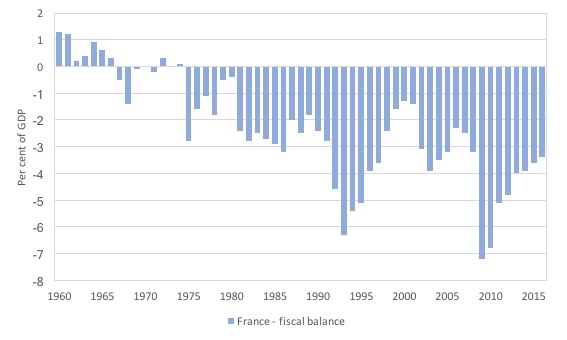
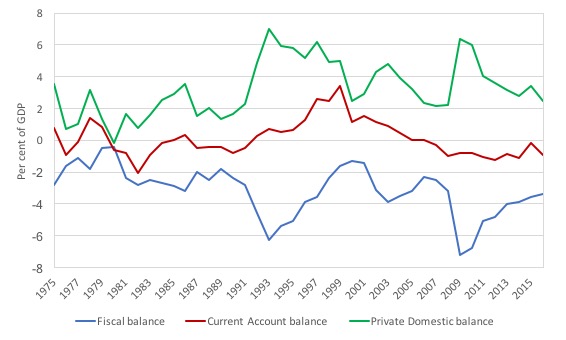
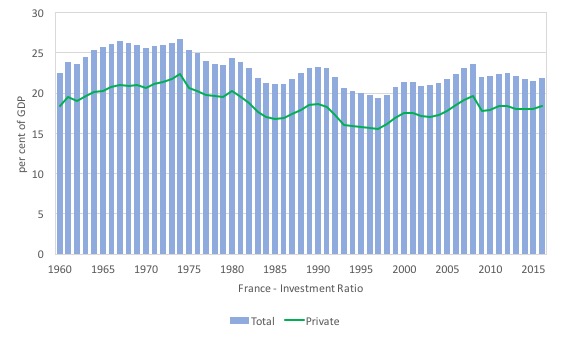
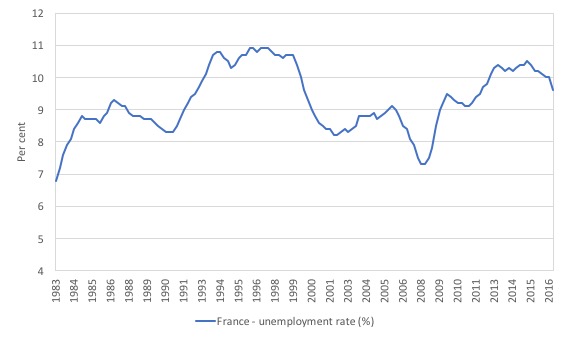
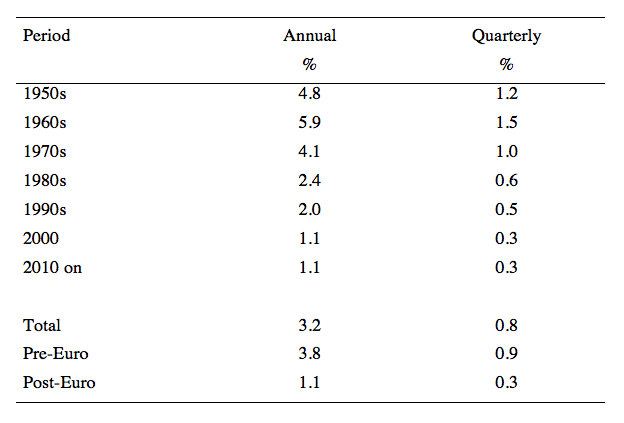
Thank you for this excellent piece. I am so aggravated by the numerous American liberals who seem to love Macron. They don’t seem to care that he will bad for French workers and in some cases they actually think that he is on right path because French workers “have it too easy.”
Interesting table of the growth in France since 1950s. I suppose its gross growth and not per capita?
The common market was promised to create prosperity and growth for common people in EU. So were the different 10-year plans (Soviet was more modest and only had 5-year plans), the Lisbon plan and now ongoing 2020 plan. So was the S&GP and the Euro promised to achieve. None of it have fulfilled its promises. But still the European and US left thinks EU is the best since sliced bread.
Suppose that’s why FT and other “serious” British media have a relentless anti Brexit campaign, they want to stop UK leaving the EU growth miracle.
The numbers in the table are they adjusted for change in the way inflation was calculated?
As I understand it, it has undergone changes. Especially in the early 90s when Friedman’s monetarism was abandoned and the model CB interest rate steering and balanced budgets was introduced, and end economic mass psychology was indicators of the economy, how did the “market” feel about the future and so on.
Wasn’t there a major shift in inflation measurements? Onetime effects weren’t counted, hedonic indexing, alternative articles was used when price on one sort did rise? The new model did get a lower inflation than the old one.
This change did coincidence with the neoliberal’s final victory in the early 90s.
If so, the growth after 1990 is overstated compared to before. The difference before and after neoliberalism Euro and so on might be even worse than the table shows.
Macron probably also must fight current account deficit to get his balanced budget, he has no sovereign currency to depress, the only thing left is internal devaluation. Suppress domestic demand. In all an impossible equation. Macron is educated at France top notch institutions; doesn’t he see it is impossible? If not, what is then the benefit of this long and expensive education?
It had been interesting to see how French per capita consumption did grow compared to GDP growth.
Here is a similar measurement for Sweden as chart:
https://s26.postimg.org/tu6b7c9a1/Konsumtionsokning_50-15-_BNP2.png
Yearly average growth per capita and decade since 1950, the colored bar is private and public consumption and the flat grey is GDP.
(one could interpret the collard bars as “socialism” vs neoliberalism)
Here is one where export net as it contributes to GDP correlates well with unemployment.
https://s26.postimg.org/904me6xh5/swe_unempl_70-09.png
The more net export of goods and services the more unemployment. The net export is here achieved by austerity for the domestic market to hamper import. Even if gross export is close to 50% relative GDP net the value added is much smaller, export industry is the biggest importer and the domestic pert of the economy is probably at least ¾ of the economy.
@ Herman ~
Neither political party in the US cares a whit about the working class. The Sanders Democrats may, but they are pretty much shut out by the billionaire class acting as the crutch to the cyclopes-eyed Clinton faction of the Democratic Party. In America, you are a billionaire, or you have no voice in politics [See the Princeton/Northwestern study, “Testing Theories of American Politics”].
The French presidential elections were much like the US presidential elections where a flawed election process in the final round only offered a largely meaningless choice between two unsuitable candidates. I suspect Trump was the ogre intended to steer the electorate to one of the neo-liberal establishment’s candidates Hillary Clinton and similarly Marine LaPen was the extremist designed to steer the electorate to one of the neo-liberal establishment’s candidates Emmanuel Macron. “Let me choose the candidates and I will rule the world” – by someone?
As the French have elected their clone of George Osborne for President and as Bill predicts the harsh austerity measures now being implemented will stall growth in the French economy and drive up unemployment and further increase hardship due to cutbacks to government services, as well as actually increase the deficit due to the automatic stabilisers of reduced tax revenue and increased unemployment benefits; this is likely to destroy Macron’s popularity. In addition his new party with new and politically inexperienced members of parliament is likely to be as orderly as a herd of cats pulling a plow. Can a worthy progressive candidate that actually understands macroeconomics benefit from a shift in political support away from Macron? Get to work boys and girls.
Francoise Hollande promises the French a workers’ paradise and then imposes austerity when elected to power. Macron promises the French the Moon and then imposes austerity when elected.
This is getting boring.
Does Macron have much of a choice? France is a part of the Euro regime. They are just like a household, business or a municipal, only for a brief period it’s possible to operate in the red, eventually there have to be black/balanced numbers on the bottom line. For a household/firm there is two ways get more income and/or cut expenditures. The first one is often easier said than done.
The EU/Euro system works as intended. It disciplines democracy and spending in the interest of the masses.
Democratic elections is more and more rendered meaningless in such a system, self-deception keeps it going.
The whole point is that the French economy is not like that of a household. Moreover, the public deficit, as pointed out above, balances the saving effects of the actual French households, so unclear what “operating in the red” means. Finally, what does it mean to “discipline democracy” in the interest of “the masses”? Either the people of a nation state are sovereign and elect their representatives to make the law and form the government, or they are not. If the French cannot express their choice through a vote, or this is rendered meaningless by “discipline” from above, they are effectively disenfranchised and their collective sovereign status just a fiction. Of course, there are usually constraints on the behaviour of governments and representatives, and the whole process is imperfect anyway, so adding in communication failures, ambiguity, compromise, human strengths and weaknesses it’s not so black/white, but that’s the simple theory anyway. Operating within the EU changes the nature of the game somewhat, but France can bargain to obtain what it wants, now in particular after Brexit, and with the Germans with egg over their faces. It has been proven that the treaties can be ignored pretty much at will, provide an agreement be worked out. A skillful, experienced, and dedicated political operator may in principle be able to obtain what is necessary for France, or at the very least to ensure his own popularity among his electoral power base, Macron no.
Surely Okun’s rule only really works if there is a reasonable distribution of GDP. If the Gini index seriously deviates from 0, then does his rule work, even as a rule of thumb? I am thinking: if the fruits of a GDP rise go to the one percent, then, since hardly anyone else benefits, unemployment would hardly change. At least, not by the amount he suggests. I realize the figure is, to some extent, a moveable feast, as it were.
“Macron announced the demand for 13 billions euros in savings by local government authorities”
Makes one wonder how he will achieve this everything already running on empty with local government. Large stimulus was needed not this.
To give people an idea about how many cuts are already in place:
*Towns which cant afford to clean the streets properly, can only half clean the street. So you see a public building with exactly half the moss/lichen cleaned off the walls from last winter. (Can see the pressure hose marks where they had to stop).
*Local government facilities like the ‘la déchetterie’ (the recycling center) are closed at odd times like Wednesday afternoon, Friday, Monday afternoon. (these times are non-uniform depending on the local council’s choice.
*The Finance Publiques (tax offices) no longer have uniform open/closed times,. Wednesday afternoon closed, close early on random days eg: at 16h on afternoon 17h another. Open later in the mornings 10:30-12:00.
*Streets full of pot holes where new lines are marked on the old road surface.
*Local councils cutting the number of bins around the town to put rubbish in.
*Bus services cut to school bus in morning, school bus in evening.
Macrons ‘reforms’ to ‘simplify governmental structures’ are the same as simplifying the structure of a house on stilts by hacking off as many stilts as possible without consideration the whole thing has become unstable.
Just like in the US many of those who voted for the current French President are going to be very surprised and disappointed with even more unemployment and wealth disparity on the way. Will the electorates shift to the extreme right or to a progressive left that seeks to abandon the neoliberal path?Time to purge the worlds left leadership of ‘Hollandites’, ‘Blairites’ and Clinton/Obama neoliberalism and cronyism and to adopt the macroeconomic approach of the MMT economists and a sound social democratic platform as well as grassroots democracy.